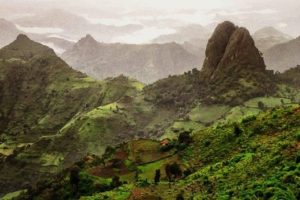
Naol Girma
Esleman Abay, Journalist, Social media influencer
Esleman Abay is a journalist working for Ethiopian national broadcaster, Ethiopian Television (ETV). Esleman is typically known for his relentless activism for Ethiopia to get its equitabble share on Abay river and continue to build Grand Ethiopian Renaissance Dam (GERD) without pressure. Esleman has attempted to show multiple benefits of the dam even for downstream countries: Sudan and Egypt. He is even nicknamed “Yabay Lij” meaning “the son of Abay”. He has exploited social media well and organized wide campaign for Ethiopian youth to stand in unison for their rights over Nile and other issues.
In addition to this, Esleman uses social media for social causes like raising charity for the needy. While he is in festive mood of Eid al-Fitr, The Ethiopian Herald approached and talked to him about his work, social media impact, the holyday and similar issues.
Take us through this period of soul searching in this month of Ramadan. How you, your relatives and friends spent it? What things you accomplished?
Ramadan is the holiest and a month of prayer and recitation of the Quraan, far more than other months of the year, and I give time to do so. I also love to listen Nasheda’s, however I choose from among the many productions which we see in the Islamic art industry. As an industry Nasheda’s have changed from what they were. Unfortunately Nasheda’s and munshids (nasheed-“singers”) have sunk to this level.
Whereas Nashedas used to have meanings of faith, jihad and knowledge, they have now – in many cases – become akin to the songs of evildoers, with softening of the voice, putting a picture of the munshid on the cover of the tape, and making video clips to accompany the Nasheed, which contain haraam things such as the presence of women or evildoers, and using musical instruments. The best of them nowadays are those that use sound effects that mimic the sound of musical instruments. No attention is paid to the meaning, rather all the attention is focused on the tune and other sound effects.
I think that Islamic Nasheda’s have changed from what they were before. They were done with voices that were not enchanting, but now they are done with enchanting voices, and they are also accompanied by wrong and corrupted tunes and they say that they are accompanied by the duff, but all of this means that when I choose to listened Nasheda, it should keep what is expected to be Islamic.
Anything special you do during the celebration of Eid al-Fitr?
I do philanthropic activities, though it’s limited to the digital space. On my social media accounts, I urge people who are in need of help. I talk about them. I let people know about their circumstances so that will help them through me or getting their addresses. If I have to mention one, recently I was on fundraising campaign for fellow Ethiopian living in Dire Dawa. This persons was having problem to buy medicine. So, I wrote about him so that people cover his medical expense. It was a success. I found social media effective to such noble causes too. He has a severe kidney problem and needed a transplant abroad. He was begging for 2.5 million birr could be succeeded in less than 20 days.
Tell us about your social media engagement? How you presence started and your work in general?
I have been trying my best to play a role in the diplomatic efforts being undertaking by our government. Using the social media platforms like Facebook and twitter, I was highly engaged in the digital diplomacy activities in the past three and four years.
In order to have an effective diplomacy a country should have a coordinated, multi-platform, public component. And digital diplomacy is one of the components for the public diplomacy. And also, Citizen Diplomacy can complement the official diplomacy.
Today’s diplomacy is deeply intertwined with global communications technologies and platforms. This shift emphasizes the importance of public diplomacy, a term coined in 1965 by Tufts’ Dean of the Fletcher School of Law Edmund Gullion to refer to efforts at forging consensus among nations by molding the public opinions of foreign citizens.
I think, our recent history of digital diplomacy has achieved several victories against the biased INT’l NGO’s like USAID, and their embassies, the Western media, their multilateral organisations like the UN. Those hopeful victories achieved under the very poor digital condition of our country Ethiopia. If we see the internet users in Ethiopia at the start of 2023, it was 20.86 million when internet penetration stood at 16.7%. At the same time, social media user in Ethiopia is only 6.40 million equating to 5.1% of the total population and the Facebook users.
According to the Data published in Meta’s advertising resources indicates that it had 6.00 million users in Ethiopia in early 2023. If we also look at the reports from the third annual edition of the Digital Quality of Life Index (DQL) Ethiopia ranks 110th among 110 countries. Covering 90% of the global population, the DQL study is conducted by the cyber security company Surf shark and evaluates countries based on a set of five fundamental digital wellbeing pillars. Joining the study for the first time, Ethiopia displays low results in internet affordability (104th), internet quality (110th), e-infrastructure (110th), e-security (107th), and e-government (107th).
How do we exploit public diplomacy in addressing national issues?
Understanding the multiple benefits of public diplomacy, the United States has a long and noted history in investing in public diplomacy campaigns. For instance, in 1986 the U.S. spent $2.10 billion on public diplomacy programs, or 45 cents per foreign citizen. In other fiscal year of 2016—U.S. spent $2.03 billion on public diplomacy programs, or just 29 cents per foreign citizen that we’re trying to inform and influence.
In a more governmental emphasis, China has continuously increasing in its budget for diplomatic expenditure. It’s a drastic jump from the zero-Covid era that saw China’s borders mostly shut: In 2020, China slashed its diplomacy budget by 11.8%, before a mild 2.4% increase in 2022.
This year’s budget, pegged at 54.84 billion yuan (about $8 billion), remains below the pre-pandemic peak, but experts say it marks a significant increase for China to resume and expand its diplomatic engagement with the world. In comparison, in the US, the requested 2023 budget for “international affairs” listed on the State Department’s website was $67 billion.
Despite, the entire above mentioned shortfall the digital public/citizen diplomatic efforts were significantly effective. especially, during the previous three water filling of the GERD as well as the third round war with TPLF, caused a tragic diplomatic crisis, on Ethiopia after the US led west opened an apparent hybrid war against a country, which is a beacon of African unity and freedom struggles.
How do you evaluate the effectivenss of digital diplomacy? In which areas these efforts have to persist?
Here the soft power resources what Ethiopia has helped to enhance the effectiveness of the digital citizen diplomacy efforts. Soft power is the ability to get what you want through attraction rather than coercion or payments. It arises from the attractiveness of a country’s culture, political ideals, and policies. Ethiopia’s history of heroic struggle for freedom is the major soft power resources among others. This then, have mate with the two worst challenges Ethiopia has been facing in the past few years. They are the western interventionist policy and Egyptian arrogance against the construction of GERD, using the colonial unilateral agreements.
In a digital battle against the two neo-colonial dangers posed on Ethiopia, the counties higher place was highly important even can grab the attention from other African citizens and from around the globe. My digital activities could enhance not only my social media skills but also increased the awareness about geopolitics and water diplomacy.
In recent years, the term ‘water diplomacy’ (or ‘hydro diplomacy’) has experienced an impressive — yet surprising — career in the lexicon of journalists, policy-makers, and their advisors. Water diplomacy is the use of diplomatic instruments to existing or emerging disagreements and conflicts over shared water resources with the aim to solve or mitigate those for the sake of cooperation, regional stability, and peace. It has the ultimate goal of ensuring regional cooperation, stability, and peace. It is much more than water resource management
It has been predicted that future wars and increased civil violence will occur as a result of competition for scarce resources such as water. Hence, Water diplomacy is one of the issues that deserve significant and efficient diplomatic practices. And I hope, the digital citizen diplomacy will be well organized and coordinated to serve the best interest of Ethiopia regionally and globally. The government is expected to give due attention for the future realities of soft power and digital influences. In years to come, many scholars predict that the most powerful weapon in this period of the twenty-first century was not sarin gas or the nuclear bomb, but the smartphone!
The Ethiopian Herald April 23/2023





